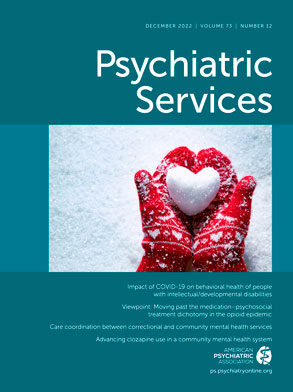The use of virtual mental health services increased dramatically during the COVID-19 pandemic. Verbal psychotherapies have been found to be feasible and efficacious when delivered via telehealth. Cognitive adaptation training (CAT) is a home-delivered psychosocial treatment, which uses environmental supports to bypass cognitive and motivational challenges. CAT providers assess clients’ home and work environments, look for presence of distractions, note availability of supplies, observe how the client performs goal-directed activities, and establish individualized supports during weekly home visits. These aspects of CAT may make it more challenging to implement via telemedicine.
We remotely delivered CAT from March 2020 to January 2021. Thirty-five individuals were receiving CAT at four sites across the country as part of an NIMH-funded effectiveness trial, and another 30 individuals were participating in a value-based clinical CAT program for Medicaid recipients who frequently use hospital services. The program seeks to decrease inpatient admission and help individuals work toward recovery. Per diem reimbursement is paid for every day an individual is not hospitalized. Flexible funding allows for the purchase of CAT environmental supports and supplies.
At the start of the pandemic, all CAT programs shifted to remote delivery via videoconferencing. For new participants, CAT’s environmental and functional assessment was conducted as participants showed specific areas of their home to CAT providers. Participants filled pillboxes with remote assistance. Supplies such as containers, signs, and other organizational items were delivered through the mail and were set up by the participant; the provider used telehealth to offer direction on placement and use.
Remote CAT was a feasible treatment. Remote assessments produced good information for treatment planning. Participants successfully set up the supports with providers' assistance. Because participants had to deal with isolation, fear, and boredom, visits were restructured to be shorter and more frequent. This flexibility in delivery is one reason CAT fits well with value-based service reimbursement. Participants and providers adjusted treatment priorities and goals. CAT therapists and participants discussed COVID-19 symptoms, how to get vaccinated, and how to make decisions about social distancing, mask wearing, and handwashing by using CAT strategies to develop new habits. Providers delivered pulse oximeters, cleaning supplies, and groceries to those who were ill with COVID-19. They helped participants stay engaged and active by taking virtual tours of countries, museums, and zoos; cooking; using meditation or exercise videos; and joining virtual groups. Grief support was also provided. Participants started online school with CAT assistance to organize learning tasks. CAT providers also helped participants structure their children’s time to reduce the stress of parenting. Providers witnessed skill generalization as recipients demonstrated effective use of CAT in assisting their families. The remote program had a focus on obtaining employment in jobs where precautions against COVID-19 spread were in place.
Examination of participant records during the pandemic indicated that remote CAT helped participants reach goals, maintain stability, and follow through with medication and treatment appointments. The greatest barriers to remote CAT use were a lack of availability of appropriate technology and unfamiliarity with its use among both participants and therapists. Keeping participants engaged virtually was a challenge for providers. Group supervision was helpful in generating novel strategies for participants and providers.
Thirty of the original 35 CAT participants remained enrolled in the NIMH study during the pandemic, and all clinical participants were retained. More staff were available in the clinical program because they spent less time driving to visits. In addition to the existing 30 clinical participants, 30 new referrals were made, half of whom were successfully engaged, a percentage that was similar to engagement levels prepandemic. Hospitalization rates in the clinical program remained at the same level as for in-person CAT.
In-person CAT is an effective hands-on treatment. Our experience indicates that CAT also can be delivered successfully via telehealth. A study comparing outcomes of in-person and remote CAT would be important for making decisions about future CAT delivery via telehealth. Virtual CAT allows for larger caseloads and could extend CAT's reach to underserved and rural areas. In-person CAT is being done in fee-for-service programs using billing codes for psychosocial rehabilitation, skill building, and medication education, with supplies donated or billed under adaptive aids where allowed.

